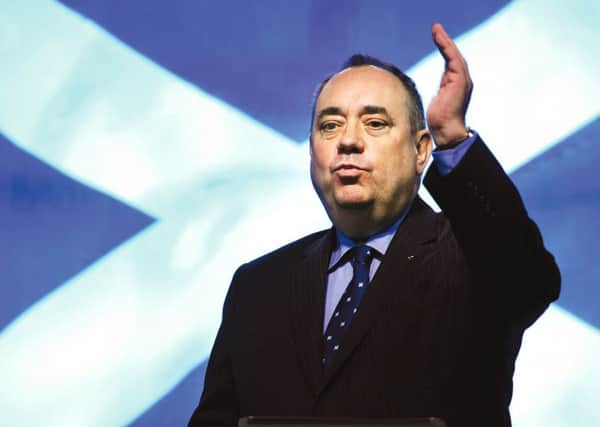Scottish independence: Salmond slams rowing Labour


The First Minister said Labour’s internal divisions meant it was inconceivable that the three Unionist parties would be able to coalesce around a vision for Scotland that would strengthen Holyrood in the event of a No vote.
His remarks last night came amid growing indications that Labour are about to retreat on plans to devolve more income tax powers to Holyrood.
Advertisement
Hide AdAdvertisement
Hide AdScottish Labour leader Johann Lamont has established a Devolution Commission to explore what additional powers should be handed from Westminster to Holyrood. It will report next month.
Early indications suggested that the commission would recommend full responsibility for income tax, including the power to vary tax-bands and thresholds.
Last week, however, concerns emerged that the commission would back-track after prominent Labour politicians questioned the wisdom of fully devolving income tax.
Salmond attempted to capitalise on Labour’s internal differences in a statement yesterday which criticised his opponents’ “half-hearted promises” to set out a constitutional settlement that would strengthen Holyrood within the UK.
“The fact is, the scale of Labour’s bitter infighting on this issue shows that it is impossible for just one – let alone all three – of the anti-independence parties to agree an alternative to independence,” Salmond said.
“That simply underlines the fact that the only offer on the table is the one in the referendum, and the only way to deliver the powers Scotland needs to create a more prosperous and fairer society is with a Yes vote in September.”
Salmond was reacting to criticisms of income tax devolution voiced by Labour’s former finance spokesman Ken Macintosh MSP and the chairman of the Scottish Affairs Select Committee Ian Davidson.
Last week Macintosh, who is a close ally of the shadow international development minister Jim Murphy, argued that transferring power over the tax to Holyrood would amount to “independence by default”.
Advertisement
Hide AdAdvertisement
Hide AdDavidson, the Glasgow South West MP, claimed the move would damage the Barnett Formula, the funding mechanism which determines how much money Scotland receives from the UK Treasury.
Macintosh and Davidson’s position, which is understood to be shared by a significant number of Labour’s 59 MPs, is said by sources close to the process to be influencing the findings of the Devolution Commission.
Concern that the commission may not recommend as radical a constitutional settlement as previously indicated was expressed by Guy Lodge, the associate director for politics and power at the IPPR, a leading UK think-tank which carries significant influence in Labour circles.
“I think it is worrying that just at the time that the polls are hinting at a strengthening of the Yes vote that Labour appears to be in retreat from an offer of tangible and substantial powers for the Scottish Parliament,” Lodge told Scotland on Sunday.
“The offer of income tax is important because there has to be a substantial offer from the Unionist parties if the Scottish electorate is to have confidence that the parties are willing to beef up the powers at Holyrood.
“To me the polling suggests that although the No vote is in front, the people who are inclined to vote No want something to feel good about. They want something positive to register what a No vote means. That has to be more powers to give the Scottish Parliament the levers, which it currently lacks, to really make progress on jobs, growth and living standards.”
Lodge added: “The majority of Scots want to see the Scottish Parliament’s powers strengthened. We think there is a strong case for empowering further the Scottish Parliament and income tax has to be at the heart of that.”
Salmond’s statement was also critical of Tory plans. Reacting to the David Cameron’s pledge that a No vote would deliver more devolution, he said: “This is exactly the same empty rhetoric on further devolution that we heard from David Cameron two years ago, since when there has been absolutely no progress whatsoever on substantial more powers for the Scottish Parliament.
Advertisement
Hide AdAdvertisement
Hide Ad“Since the Prime Minister’s last fudge on more powers we have had two years of inertia and two years of the anti-independence parties’ half-hearted promises to come up with an alternative to independence.”
Salmond added: “The only reason they are talking about more powers now – after blocking such an option from the ballot paper – is because they see the polls narrowing and the Yes campaign with the wind in its sails.”
Last night, a Scottish Labour spokesman said: “We believe devolution offers Scotland the best of both worlds – a strong Scottish Parliament backed by the economic certainty and security of the UK.
“That is why a Labour government delivered the Scottish Parliament in 1999, set up the Calman process that brought about the new tax and borrowing powers in the Scotland Act and have set up the Devolution Commission, which will announce more plans to strengthen the Scottish Parliament at our conference next month.”
He added: “The only threat to devolution is Alex Salmond’s referendum, and his unworkable plan to hand control over our budgets to a foreign country we had just left in return for using the pound.”
SEE ALSO: